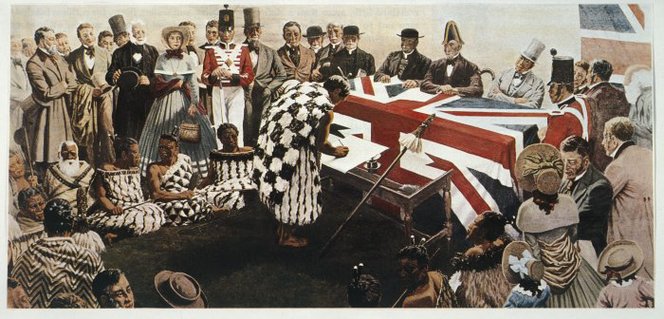
Today New Zealand marks the signing of the Treaty of Waitangi in 1840. In that year, representatives of the British Crown and over 500 Māori chiefs signed what is considered to be New Zealand’s founding document. The day was first officially commemorated in 1934, and it has been a public holiday since 1974.
The treaty came from, the desire of the missionaries to protect the Māori from the greed and encroachment of the European expansionists. Especially given the lawless nature of the town of Kororāreka. It served as a recreation and provisioning centre for trading and whaling ships and a meeting place between Māori and Pakeha. The first European town in New Zealand it had been dubbed the ‘hell-hole of the Pacific.’ Sporadic attempts had been made to bring order there without success.
Church politics also influenced the desire for a treaty making Aotearoa, a British Colony. New Zealand's first missionaries were from the Anglican Church Missionary Society, in the form of Rev Samuel Marsden, but Roman Catholic missionaries had arrived by the time of the Treaty signing and a ship carrying French settlers was on its way and a French terriotory would more strongly support the Roman Catholic Church.
Rev Henry Williams (one of the main instigators of the Treaty) has been accused of protecting his own interests, having purchased land from the Māori for his children. But protecting his Māori congregation, for whom he was answerable to God, was of equal importance to him. Many quotes by himself and his wife, show he viewed his Māori converts, as his spiritual children, his having delivered them into faith in Christ. He believed he was acting in their best interests.
Waitangi Day is our National Day and a public holiday; but it is more than that for Māori, it is the occasion for the government to acknowledge their role as Treaty partners and hear the strong voice and concerns of Māori. It is the day that the Prime Minister, faces up to Māori at the Marae where the Treaty was signed to answer their concerns. Changes in legislation can come from this meeting, as the strong Māori voice is heard, the past is honoured, the present acknowledged and the future considered. Many of these concerns are not just relevant for Māori but for ALL New Zealanders.
 Welcome
Welcome Calendar
Calendar Today's Word
Today's Word Lauds
Lauds Terce
Terce Sext
Sext None
None Vespers
Vespers Compline
Compline Matins
Matins